- Home
- Richard Powers
PLOWING THE DARK Page 2
PLOWING THE DARK Read online
Page 2
They stepped together through the missing rear wall, into the glowing room. Just like that: the audience, walking through an invisible proscenium, onto a floor-level stage. Adie found herself standing in an empty space, six by eight by ten feet, made from five large rectangles of white sandpaper. Even the floor and ceiling were movie screens.
This? You're joking. This is nothing but a glorified walk-in closet. Put these on, Spider Lim answered. Plastic glasses: lightweight, tinted, wraparound. A high Hollywood fashion statement teetering between fabulously futuristic and ridiculously retro.
But they have wires coming out of them. She tweezed them at arm's length, between thumb and pinky.
Spider's face crimped. So? Years later, she would sketch him like that: the young Rembrandt scrunching up, incredulous, in the light of the mirror's report.
So I don’t want wires anywhere near my head.
You're kidding me. Spider laughed. Get out of my life.
Doesn't... don’t wires make a magnetic field or something?
Stevie reasoned with her. You've used a Walkman, haven't you?
I've never let my head anywhere near a Walkman. I don't even like saying the word.
Spider answered with a marvelous sound: a rapid click of the tongue against hard palate. The sound the neighborhood boys' baseball cards made once, rubber-banded to bicycle spokes. The noise of the industrious world engine, impatient for its next run.
She put the glasses on and waited for the view, like a Louisville deb holding tight after her first hit of acid, her virgin sight about to be forever despoiled. Her eyes looked through the tinted lenses, not knowing what to expect. And they saw nothing at all.
Hold it. Hang on. Spider stood between her and Spiegel, sporting his own set of glasses. He swayed, waving and clicking a thing that looked like a TV remote. We're snagged on something.
The trio stood staring at a blank wall. Spider Lim made the ratchet noise. Adie had to keep from slugging him with pleasure. Do that again!
What? Do what? Nothing's started yet.
That thing with your tongue.
Spider, lost to the problem, ignored her. His life's work: already to be someplace else by the time anyone else got there.
He temporized. We've gone over to a new configuration. Just this week. A separate graphics engine for each wall. It's causing us some sync problems.
The white is pretty, Adie offered.
Here we are. Here goes.
They gaped at the blank walls. Then the expanse of emptiness cleared. Up from a hidden seam in the whiteness, a stone slab emerged: a chunk of burnished marble chiseled with text, something Herod would have slapped up on an imperial stele to appall the natives, as deep into rebellious Judaea as he could get away with. The plaque twirled about in space before settling back down in midair, to be read.
That spinning stone even cast real shadows. No sooner did Spider land the first slab than he hooked another. The second plaque flopped out of the wall and pirouetted in space in front of Adie. She fought the urge to reach out and pinch it.
More stone tablets materialized from on high. They fell into formation alongside one another, forming the beveled buttons of a menu. A floating finger moved upon this list, a disembodied digit that tracked the waves of Spider's wand.
From the several choices, he selected a slab labeled Crayon World. Here we go, he said. Hold on now. He clicked, and the floating finger riffled. The marble button receded, as if really pressed. The menu beeped and dissolved. For a moment, the walls went dark. When they lit again, they were no longer walls.
A hailstorm of aquamarines filled Adie's vision, a shower of silver-blue shards, as if the air had just shattered. Then the shards condensed, reassembling into a blue ceiling. The three of them stood in their own bodies, under a blazing sky. Yet they floated above the scene they looked at, canted at an impossible angle. Adie's knees buckled. She pitched forward, compensating for this snub to gravity. When she righted herself, so did the Crayon World below.
Another cloudburst of topazes and Adie began to make out the place where they'd landed. Her gaze zoomed and panned, as dazed as an infant's eyes sifting their first light. No sooner did she right herself than nausea upended her again. She felt as she always had, on those five-thousand-mile childhood flights around the world to yet another new home, airsick for days at a pop. But this was the very opposite of motion sickness: still-illness, frozen in a yawing landscape that bobbed all around her.
Adie, now a cartoon of herself, stood treading on an invisible magic carpet. She, Steve, and Spider walked the plank above a seething grass sea. Only there was no plank, and the grass was no more than scribbles of crayon.
She looked up. The teal tent above them now billowed with cloud. She looked down at her shoes. They skimmed over the tops of trees, trees rooted well beneath the floor that projected them. Each crayon image slid seamlessly over the room's corners, erasing all sense of the cubicle that they inhabited. A few trillion bits of math, to fool a few billion years of ocular evolution: after a few seconds, Adie stopped noticing the conjuring act and began to believe.
Here, Spider said. You drive. And he thrust the wand into her hands. Where’s the clutch on this thing? She never could drive a stick. Adie bobbled the wand, jabbing at the buttons with her thumbs. The world's RPMs raced, and a burp rippled through its crayon portrait. The stand of would-be blue spruce they threaded went masts down and keel to heaven. She swung the wand hard to the right. She and the men banked back in the opposite direction.
What's that? she whispered, afraid the thing might bolt. That. There. It just moved.
God only knows, Steve whined. That's our problem. Millions of dollars of funding, and nobody around this dump can draw worth squat.
His voice seemed to come from just to her left, though Adie would never again trust her sense of distance. As she turned to look at him, the Crayon World wrapped around her, tracking her head. Spiegel's grin leaked out from under his own pair of wraparound glasses. Go on and follow it, if you like.
Adie squeezed the wand and steered away. In three short bursts, she put half a moraine between herself and where Steve stood. Yet he stayed right next to her, meadow for meadow, bog for bog.
What are those things supposed to be: cattails? bulrushes? What in the world is that Douglas fir doing over there, all by itself?
Stevie threw back his head and snickered. Some chassis-jockey must have drawn that one. They have all the visual intelligence of a myopic, right-hemisphere-damaged eight-year-old loose with his first sixty-four-color box.
Spider Lim just smiled at the coder's taunt. Like software knows how to draw any better?
But it's fantastic, Adie demurred. Change one... one mark on it and I'll kill you in your sleep.
Pixel, Spider corrected. Change one pixel. And you'll kill us.
Voxel, Spiegel overtrumped him. Keep current, will you, Lim? Voxel or boxel. A 3-D pixel.
How come you didn't paint the backs of anything? I mean, look at this stump. A very funky mahogany, although I do like the Cubist growth rings. But if we go around to the other side? Nothing but white. That's the paper, Spider apologized. The paper?
The paper we drew them on. Yeah. We were too bloody lazy to ...
Hardware elbowed software in the floating rib. This particular world is not really about painting the stump, you know. It's about getting the head-position tracking to work ... With the Kalman filtering ... Not to mention the human head ...
While doing these massive bit-blits from one graphics array area to another at sufficiently high speeds and resolutions to—
Look, look! A house. Did you know there was a little house out there? Don’t you boys snort at me. Can we walk behind it? Does the world go back that far? Look! Flowers. What— ? Tul—, no iri—
How many times we gotta tell you? You're not dealing with bloody Pick-ax-o here ...
Oh God! Adie shouted. Little bees. And they're buzzing! Crude black-and-golden scraps with loops of s
traightened paperclip wings jittered about in organized confusion. Something turned over in her, as small, as social, as buzzing and robotic as the living original. They like it around the flowers. Steve pointed off into a glade. Try waving the wand over there.
She did. The magic scraps of would-be bees swarmed after every trail of digital scent she laid down willy-nilly.
Adie soared and looped and rolled. Each time she cocked her head, the trailing wires that tracked her goggles pulled the whole landscape along in her sight's wake. She waved the magic wand through ever more elaborate wingovers and Immelmanns. She skimmed above the trees and plowed through furrows between the grass blades. She navigated out to the farthest walls of this confinement and jiggled the ground beneath her feet with her giggling.
You like it, then? Steve demanded. You really like it?
I never dreamed ... I've never seen anything like it.
Outside the Cavern, beyond the enveloping lab, past the research park's camouflaging cedar shingles, out on the fringe of the coastal forest, the hurt of a screech owl skipped like a stone across the night's glassy surface. Long-haul commerce whipped its errand trucks up and down the evacuated coast road, hard as scythes. But inside this womb of cool engineering, ingenuity schooled its hatchlings by moonlight.
You'll come in with us, then? Steve asked Adie. You want to play?
Some part of her had never wanted anything else. Had never hoped for more than to play in such a place, or even in its ugly machine imposture.
The three of them strolled out of the paper meadows and walked back into real weather. They left the high-tech monastery, stepping out into the actual night. It seemed to be seedtime, early in the curve of the world's regeneration. Say it was raining. A wrap of mist condensed on their clothing, coating them in a fine glaze. A few scared birds clicked and whistled in the night, to find themselves out.
They stood together in the dark parking lot, next to the rental car that was to take Adie back to her tepee-shaped theme hotel down along the old state highway. Lim toyed with a geode key ring. Spiegel leaned on the rental, awaiting her answer. Klarpol, for her part, could not stop laughing, shaking her head side to side in disbelief at what she'd just seen. Images built and broke inside her. For the first time in as long as she cared to remember, the future held more pictures than the past.
Stevie, it's amazing. But I cant. I really cant.
What does that mean, exactly?
What, indeed? The very weather, that first night, interrogated her, dared her to say exactly what she had sworn off. And the wider box of evening—the scrim of midnight—mocked all her available replies.
It's not paint, he said. No paint involved at all. No original expression required, Ade. It's all drawing by numbers, out here. Dont think of it as art. Think of it as a massive data structure. What SoHo doesn’t know wont hurt it.
She laid out all her objections, lined them up in a mental pulldown menu. None held water except the last: a general hatred for all things that the cabled world hoped to become. Yet something tugged at her. Something darting and striped and buzzing.
Those bees, she answered him. How do they know how to find those flowers? How do you get them to fly like that?
Something in those jittery black-and-golden scraps recalled her sight's desire. So it always went, with life and its paler imitations. The things that needed renouncing—our little acts of abdication, our desperate Lents—finally caved in. They slunk off, subdued by hair of the dog, their only cure. The abandoned palette returned to press its suit, sue for time, advocate.
All Adie had ever wanted was to people this place with gentian and tree rings and hidden houses folded from out of cardstock, to raise stalks under an animated sky, a sky calling out for glade-crazed, pollinating paper honeybees that followed every trail of scent that the wave of thought's wand laid down.
You bastards, she said. You filthy bitheads. She looked up, helpless, ready, her wet eyes seeing everything.
3
In the Crayon Room, all strokes are broad.
Wax goes on nubby. It clumps and gaps. Your main repertoire here is the happy smear. Leaving an edge is hard. Any two colors mix to make coffee. From faint to heavy, from dawn to dusk, the crayon sea and the crayon causeway stay chirpy, pert monotones.
The grain beneath the page seeps up to enter any scene you draw. Spread your newsprint on the sidewalk and make a fish; your fish comes into the Crayon World already fossilized. Rub a stick of brown lengthwise against a nude page; the plank behind the paper clones its own knots and whorls, returning the pulp to its woody matrix.
Every crayon furnishing is a flat faзade. The sun's disk serves as its own nametag. Head-on, distant hills flatten to platters. From the visitor's floating crow's nest, scarecrows deployed in this ripening grain have no more width than the paper they're scrawled on.
Signs of human life abound. A bitten apple hides amid the pile rotting at the foot of a tree. An abandoned bucket, half full, slops its squiggles of water. A bent rag doll sits compliant on a bench. A kite tied to a picket fence floats ripe for unleashing.
But this world leaves no trace of its makers. No people populate the Crayon Room. It is a simple place, pristine, prelapsarian. Curls of smoke craze up from the crippled chimney of one little summer cottage, too cozy for habitation. Behind gapped, sashed windows, a crayon cat purrs, fixed on a goldfish that darts against its rough-hewn bowl.
The Crayon World is a proud mother's gallery, the first retrospective refrigerator-magnet show of a budding child genius. But nothing here looks much like what it stands for. Only the conventions of a house, the insanely pitched roof, the burnt sienna front door lolling on its hinge. The code for cat and apple and bucket and tree and abandoned doll.
Visitors here face down their own ghostliness. The casual walker collides against nothing. Try to climb a hill, and you pass right through it. Hedgerows serve as mere suggestions. Approached, their bushes swell in detail, swimming toward the eye until they fill it. Then, with an optical pop, they vanish, freeing the scrawled grazing lands beyond them.
Now and then, an eagle shrills, invisible. Otherwise, silence, save for the gurgle of a hidden stream and, down in the gardens, the drone of the loosened hive. Circlets of scissored medallions buzz freely, in skittish digital trajectories, each striped with the icon for honeybee. Their randomly cycled rasp, the sound of fidget flight, stands in for the beating of insect wings.
A wheelbarrow in scarlet wax sits tilted on a path somewhere down a projected dell. The pasture is plain and the woods a welcoming cartoon. This mad perspective, drifting between dimensions, is perfect for getting lost in.
The Crayon World feels bigger than it is. Its space is curved. It wraps back onto itself. Hikers strike out to the southwest, into a weald of clumsy flowering horse chestnuts. The stroll unrolls, always a new copse in front of you. The hike moseys on, furlong stretching into mile, mile into league, for crayon measures conform to the lost imperial units of bedtime enchantment.
Sky blue drops to Prussian, then to a darker cobalt. And still, ever more southwest stretches out in front of you. More than when you started. Your walk in the woods threatens to turn into a panicked sprint. Then the crayon receptors at the edge of your retina say wait: that tree is wrong. That tree shouldn't be here. And in that mental crossing where scribbles synapse against words, you wonder: Where have I seen that thing before?
Sure enough, in a ridiculously few steps, the tree returns. It looms up from the same speck on the same compass point, without your shifting tack. It zooms to the same height as you draw close. It bares the same rift down the middle of its data. Even before you can wonder how you missed it, the trail loops and the whole scene recycles.
The wand you use to wend through this wilderness has a knob for leaving breadcrumbs. But as in all such worlds, the crumbs attract a murder of crayon crows that devour your trail markers the moment you lay them down. All your wax signs will not guide you for more than a virtual minute. Th
e path is past preserving, and the crayon adventure knows no goal except itself. The Crayon World is just a broad-stroked test. The test of how to enter it, and walk back out intact.
4
When rage reprised itself, when you fell back again on the old bitter tit for tat, when the need to escape finally left you throwing darts at the world map, at last it hit you. Simple choice: replay the old routine, the self-triggering cycle of accusations, the verbal razor cuts daubed in love's alcohol. Traipse down the path of tender sadomasochism yet one more soul-shredding time. Or turn around and walk. Escape down the path that must still lie somewhere to the south, the way you walked in.
One more tearful reconciliation would only further demean you both. The place you pushed for—the tumbledown house in the country, your dream of intimacy that always made her bite in fear—vanishes now into fantasy. It gives way to that darker late-night venue, where hisses of desire shade off into abuse, abuse feeding back into desire.
You've been each other's shared addiction, slinking back repeatedly to the nightmare rush that you've both fought to be rid of. you've come back from the dead a dozen times, only to spin out again, worse, for whole weeks at a time. You've suffered the delirium of total withdrawal: one month, two, without so much as a word. Then, clean, virginal, at peace, calling again, just to see if you can. Just to see who's in charge. Just a quick little needle slipped into one another's waiting veins.
All that changes forever, this Friday. You're off to a place where you can't ask her to hurt you again, where neither of you can backslide into care. Where you can no longer reach one another, however much mutual tenderness revives. It rocks you, just to imagine.

 The Overstory
The Overstory Bewilderment
Bewilderment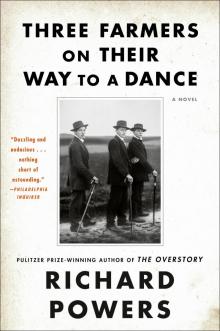 Three Farmers on Their Way to a Dance
Three Farmers on Their Way to a Dance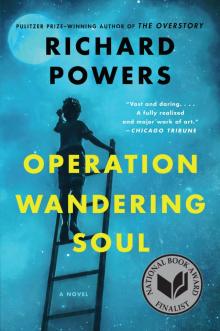 Operation Wandering Soul
Operation Wandering Soul Prisoner's Dilemma
Prisoner's Dilemma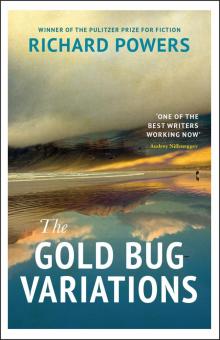 The Gold Bug Variations
The Gold Bug Variations Generosity: An Enhancement
Generosity: An Enhancement The Echo Maker
The Echo Maker Orfeo
Orfeo The Time of Our Singing
The Time of Our Singing PLOWING THE DARK
PLOWING THE DARK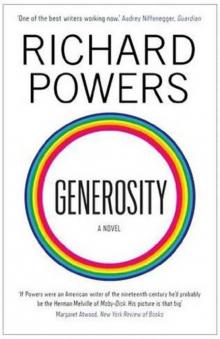 Generosity
Generosity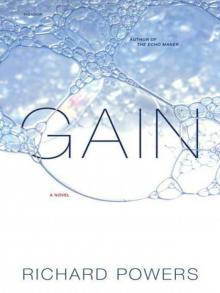 Gain
Gain